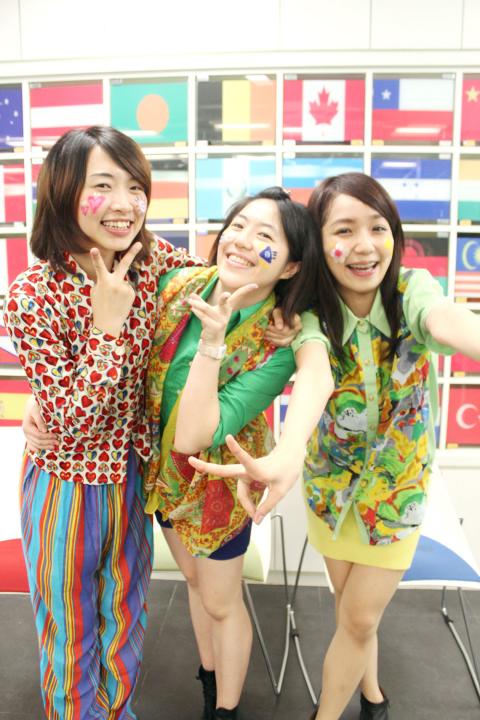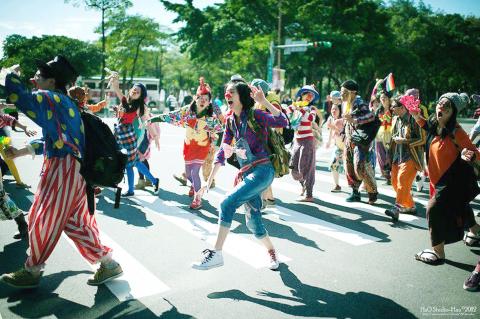It is rare to see clowns performing on the streets in Taiwan, as such performances are usually reserved for amusement parks, but the members of Clown Heart Studio want to change all that and bring clowning to a wider audience.
Founded by four Taiwanese female clowns in their 20s, Clown Heart Studio endeavors to combine clowning with good causes, such as visiting patients to lift their spirits.
The Clown Heart concept began in Europe and Taiwan is the first country in Asia to take it up, said Huang Kuang-ying (黃冠瑩), one of the founders of the studio.

Photo: Lin Chiao-lien, Taipei Times
Huang said she traveled to Italy when she was 20, where by chance she attended a Clown Heart training workshop and joined their tours of hospitals, psychiatric institutions and orphanages.
“The experience made me realize that working for a good cause can bring happiness to everyone. So I decided to bring this concept back to Taiwan,” she said.
Huang said that most people see clowns as comedic circus performers who make people laugh, but who are tragic figures who can often be found crying backstage.

Photo courtesy of Clown Heart Studio
She said that a Clown Heart performance is a special art form, utilizing body movements and unleashing the clown that is hiding in each individual.
“It allows people to think more positively and to bring joy to the audience through each performer’s unique personal style,” she said.
Huang and two other founders of the studio, Yang Tsu-wei (楊子葳) and Chen Wan-ting (陳琬婷), traveled to Italy in May last year to attend another Clown Heart training session.
They discovered that social work need not be somber and gloomy, and that they should strive to bring happiness to those who need it.
“I have always wanted to promote good causes, but I did not know how to go about doing it. Following my training with Clown Heart, I could not forget the joy and emotional uplift it brought out in me, so I began to think about how to introduce this to Taiwan,” Huang said.
On her return, Huang secured corporate sponsorship and invited Alessio di Modica, a renowned Italian Clown Heart trainer, to start a workshop for Taiwan’s Clown Heart Studio.
Yang, who is in her final year at university, uses her spare time outside of classes to organize meetings about the studio’s work and prepare the studio’s classes.
She said that Clown Heart training can show participants that every individual can contribute to society much more than they might have imaged.
“Because of this, I now deal with life in a more positive and proactive way. Students became more willing to offer their time and resources to good causes,” Yang said.
Another member, Lin Yu-hsuan (林鈺軒), read the movement’s slogan: “If you can’t fly with an angel, then dance with a clown.”
Through training and role play, the studio opens up students to their creative comedic personality, which is unique to each individual.
Thirty students signed up for the studio’s first workshop last year. After the training, the students performed at Taipei Railway Station and for patients at National Taiwan University Children’s Hospital.
“When performing on the streets, we gave hugs to strangers,” said Hsiao Lei (小雷), one of the students. “We did performances to elicit laughter from onlookers. A woman was pushing her father in a wheelchair and after watching our performance, her father cheered up and began to laugh. Afterwards, the woman hugged me and kept on thanking us because she said her father had not laughed in a long time.”

Trips for more than 100,000 international and domestic air travelers could be disrupted as China launches a military exercise around Taiwan today, Taiwan’s Civil Aviation Administration (CAA) said yesterday. The exercise could affect nearly 900 flights scheduled to enter the Taipei Flight Information Region (FIR) during the exercise window, it added. A notice issued by the Chinese Civil Aviation Administration showed there would be seven temporary zones around the Taiwan Strait which would be used for live-fire exercises, lasting from 8am to 6pm today. All aircraft are prohibited from entering during exercise, it says. Taipei FIR has 14 international air routes and

Taiwan lacks effective and cost-efficient armaments to intercept rockets, making the planned “T-Dome” interception system necessary, two experts said on Tuesday. The concerns were raised after China’s military fired two waves of rockets during live-fire drills around Taiwan on Tuesday, part of two-day exercises code-named “Justice Mission 2025.” The first wave involved 17 rockets launched at 9am from Pingtan in China’s Fujian Province, according to Lieutenant General Hsieh Jih-sheng (謝日升) of the Office of the Deputy Chief of the General Staff for Intelligence at the Ministry of National Defense. Those rockets landed 70 nautical miles (129.6km) northeast of Keelung without flying over Taiwan,

The Ministry of National Defense (MND) today released images of the military tracking China’s People's Liberation Army (PLA) movements during the latest round of Chinese drills around Taiwan. The PLA began "Justice Mission 2025" drills today, carrying out live-fire drills, simulated strikes on land and maritime targets, and exercises to blockade the nation's main ports. The exercises are to continue tomorrow, with the PLA announcing sea and air space restrictions for five zones around Taiwan for 10 hours starting from 8:30am. The ministry today released images showing a Chinese J-16 fighter jet tracked by a F-16V Block 20 jet and the

City buses in Taipei and New Taipei City, as well as the Taipei MRT, would on Saturday begin accepting QR code payments from five electronic payment providers, the Taipei Department of Transportation said yesterday. The new option would allow passengers to use the “transportation QR code” feature from EasyWallet, iPass Money, iCash Pay, Jkopay or PXPay Plus. Passengers should open their preferred electronic payment app, select the “transportation code” — not the regular payment code — unlock it, and scan the code at ticket readers or gates, General Planning Division Director-General Liu Kuo-chu (劉國著) said. People should move through the